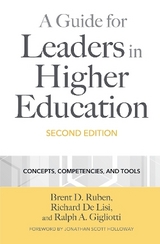
A Guide for Leaders in Higher Education
Stylus Publishing (VA) (Verlag)
978-1-62036-392-8 (ISBN)
- Titel erscheint in neuer Auflage
- Artikel merken
At a time when higher education faces the unprecedented challenges of declining revenues and increased scrutiny, questions about access, cost, and the value of degrees, and the imperative to educate a more diverse student body, there is an urgent need for leadership that is conversant with, and able to deploy, the competencies, management tools, and strategic skills that go beyond the technical or disciplinary preparation and “on the job” training that most leaders have received.
This book is intended as a practical resource for academic and administrative leaders in higher education who seek guidance in dealing with today’s complexity, opportunities, and demands. It is also addressed to those who aspire to hold positions of leadership, and to the many faculty and staff members who serve in informal leadership roles within their departments, disciplines, or institutions. Additionally, the book serves as a guide and resource for those responsible for the design and implementation of leadership development programs in higher education.
While recognizing the differences in mission and circumstance across institutional types, the authors begin by offering a foundational understanding of higher education as a sector, the political, social, and economic climate in which it operates, and the potential opportunities ahead. Subsequent sections of the book cover leadership concepts and competencies, along with a series of applied tools for leadership and organizational effectiveness. Each chapter concludes with related case studies and guiding questions for further reflection. The final section highlights models for developing institutional leadership programs that progressively meet the needs of leaders along their careers.
The content and format of this book reflect the authors’ views that leadership development is most effective when it is an intentional, reflective, and systematic experience. While they espouse the practice of general principles of leadership, they also take into account the unique context of higher education with its numerous internal and external stakeholders, multiple missions, particular organizational governance, and a culture that fosters individual autonomy and creativity.
Brent D. Ruben, PhD, is a distinguished professor and executive director of the Center for Organizational Development and Leadership at Rutgers University. He is also a member of the faculties of the Rutgers PhD program in higher education and the Robert Wood Johnson School of Medicine. Ruben's academic interests include human communication, organizational leadership, planning, assessment, and change. He has authored numerous publications including Excellence in Higher Education Guide (Stylus, 2016), What Leaders Need to Know and Do (National Association of College and University Business Offi cers, 2006), and Communication and Human Behavior (Kendall Hunt, 2014; 5th edition with L. Stewart). Ruben was a founder of the Rutgers School of Communication and Information, and he served as a department chair and graduate program director. He is Rutgers liaison to the Big Ten Academic Alliance leadership programs and serves as an adviser to colleges and universities nationally and internationally. Richard De Lisi is a university professor of educational psychology at the Graduate School of Education at Rutgers University. Having joined the faculty in 1976, Richard has more than 20 years of experience as a formal leader at Rutgers as department chair, graduate program director, and dean of the Graduate School of Education from 2003 to 2014. He is a developmental psychologist who has investigated cognitive development and sex-related differences in academic achievement. Richard's most recent scholarly interests pertain to leadership, excellence, and accountability for student learning and development in higher education. Ralph A. Gigliotti, Ph.D. is Director of Leadership Development and Research at the Rutgers University Center for Organizational Leadership, where he oversees a portfolio of faculty and staff leadership development initiatives and leads several research projects related to leadership and communication in higher education. He also serves as a part-time lecturer in the Department of Communication and associate faculty member in the Ph.D. Program in Higher Education at Rutgers. Ralph's research appears in numerous books and journals, including the Journal of Leadership and Organizational Studies, Journal of Leadership Education, and Atlantic Journal of Communication. Click here to visit Ralph's personal website.
Foreword—Doug Lederman
Preface & Acknowledgements
Part 1: Leadership in Higher Education: A Critical Need in a Complex and Challenging Landscape
1) Leadership and Leadership Development in Higher Education: Time for Change
2) The Higher Education Landscape: Navigating the Organizational & Strategic Leadership Terrain
3) College and University Missions: Purposes, Principles, and Perspectives
4) Higher Education's Multiple Stakeholders: Perspectives and Pressures
Part 2: Leadership Concepts and Competencies
5) Campus Cultures and Intercultural Tensions: The Leader as Organizational Ethnographer and Cross-Cultural Communicator
6) The Challenging Transition from Pilot to Air Traffic Controller: Leadership in Crowded Skies
7) What is Leadership?
8) Leadership-Communication Connections
9) The Competency Approach: A Two-Dimensional View of Higher Education Leadership
10) Formal and Informal Leadership in Higher Education: Roles and Responsibilities
Part 3: Applied Tools for Leadership and Organizational Effectiveness
11) Becoming a Better Leader: Self-Assessment and Leadership Development
12) Envisioning and Achieving Excellence: A Rubric and Practical Tool for Organization Review and Improvement
13) Strategic Communication: Developing Essential Habits for Effective Leadership
14) Strategic Planning: Core Concepts and Critical Steps
15) Understanding and Leading Change in Colleges and Universities
16) Using Metrics to Track Progress, Measure Outcomes, and Assess Effectiveness
17) Crisis Leadership: Upholding Institutional Values
18) Organization Continuity and Change: Leadership Succession Planning
Part 4: Leadership Development Models
19) Leadership Development in Higher Education: A Snapshot of Approaches, Characteristics, and Programs
Epilogue
APPENDIX A: Intercultural Communication Behavior Scales
APPENDIX B: Leadership Competencies Scorecard 2.0
APPENDIX C: Change Planning Worksheets
APPENDIX D: Snapshot of Signature Leadership Programs at Big Ten Academic Alliance Member Institutions
References
About the Authors
Index
| Erscheinungsdatum | 03.12.2016 |
|---|---|
| Vorwort | Doug Lederman |
| Zusatzinfo | 36 tables, 56 figs and 5 boxes |
| Sprache | englisch |
| Maße | 152 x 229 mm |
| Gewicht | 665 g |
| Themenwelt | Sozialwissenschaften ► Pädagogik ► Bildungstheorie |
| Sozialwissenschaften ► Pädagogik ► Erwachsenenbildung | |
| ISBN-10 | 1-62036-392-5 / 1620363925 |
| ISBN-13 | 978-1-62036-392-8 / 9781620363928 |
| Zustand | Neuware |
| Informationen gemäß Produktsicherheitsverordnung (GPSR) | |
| Haben Sie eine Frage zum Produkt? |
aus dem Bereich



